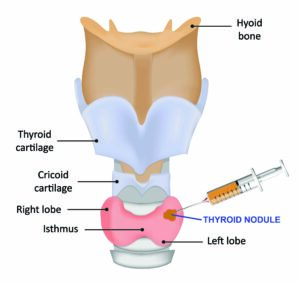What are thyroid nodules?
Thyroid nodules are lumps that form in the thyroid gland, which is located in the neck. They may be a solid or fluid-filled lump that forms in the thyroid gland which can be benign (noncancerous) or malignant (cancerous). They can also be functional (overactive) or non-functional (not overactive). Thyroid nodules are relatively common and are found in up to 50% of the population. However, most thyroid nodules are benign and do not cause any symptoms or require treatment. The discovery of thyroid nodules is often incidental, found during a routine physical examination or imaging study for another reason.
What causes thyroid nodules?
Thyroid nodules are a common condition of which the cause is yet unknown. They are more common in women than in men, and the frequency increases with age. According to some studies, about 5-7% of thyroid nodules are malignant. These slow-growing lumps (millimeters over months or years) may be due to iodine deficiency as well as exposure in childhood to ionizing radiation – all without causing any symptoms most times.
How would I know if I have a thyroid nodule?
Most nodules in the thyroid do not cause any symptoms ie. patients are not aware that they have one. But when they reach a certain size, their location near the food pipe (oesophagus) and breathing tube (trachea), may lead to symptoms including a sensation of a lump in the throat and even difficulty swallowing or breathing. As mentioned earlier, if a nodule is overactive, it may be picked up on blood tests first and then confirmed with an ul;trsaound scan. Another way in which thyroid nodules may be detected is incidentally – when tests are being done for another reason, but picks up an abnormality elsewhere.

Investigation of thyroid nodules
Once a nodule is detected it is best you go and see your general practitioner for further investigations. Common investigations include blood tests, an ultrasound scan of the thyroid and possibly a nuclear medicine scan of the thyroid gland. Depending on the appearance and size of the thyroid nodule, a fine needle aspiration biopsy (FNA or FNAB) of the nodule may be required. FNA of a thyroid nodule is one of the most important tests as it is getting cells from the nodule to help determine what the nodule is – benign or malignant (cancerous).